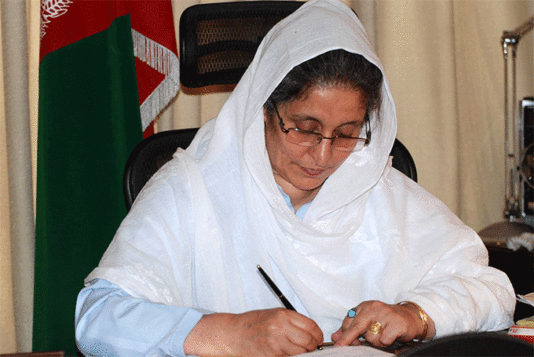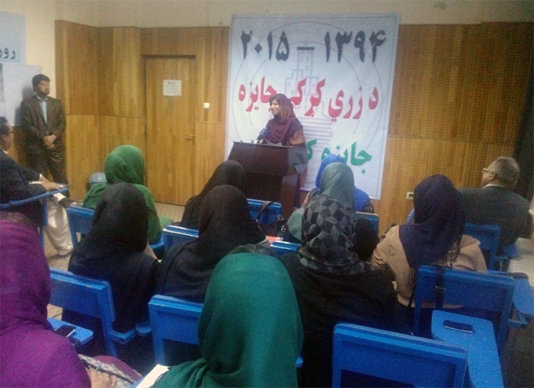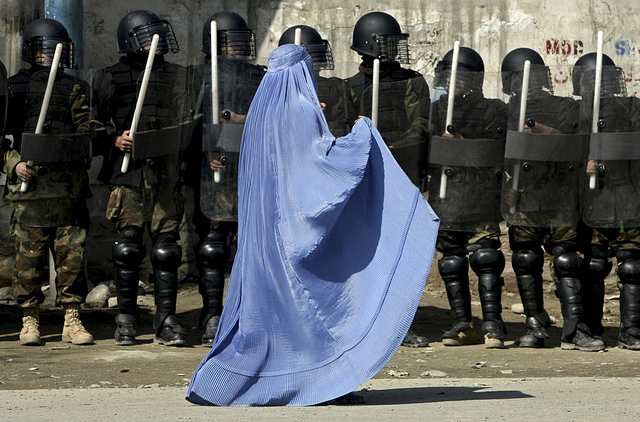- About
- Topics
- Story
- In-Depth
- Picks
- Opinion
- News
- Donate
- Signup for our newsletterOur Editors' Best Picks.Send
Read, Debate: Engage.
| May 12, 2015 | |
|---|---|
| topic: | Women's rights |
| tags: | #Afghanistan, #Merman Adabi Baheer, #poetry, #Saheera Sharif, #women's rights |
| located: | Afghanistan |
| by: | Shadi Khan Saif |
What makes Saheera Sharif different to many other women's rights activists is her unique approach towards the resolution of issues and securing rights for her underprivileged gender in this traditional society. Her choice in this regard is poetry. “Repeated and loud calls, workshops and seminars usually do not bring a lasting change like touchy poetry that provokes thoughts and remains eternal as a call for enlightenment, peace and love,” she claims.
Saheera Sharif is the founder of “Merman Adabi Baheer”(Pashto words for the Women's Literary Movement). It is an unprecedented women literary society in Afghanistan that has emerged from a small circle of poets into a nationwide movement making the voice of women and girls heard with patience and respect.
FairPlanet correspondent in Kabul Shadi Khan Saif talked with Mrs Sharif about her vision and views and about a country and its people that have often made headlines across the world for brazen militant attacks.
FairPlanet: Well, first of all thank you so much for sparing time to share your thoughts with us. How did you conceive this idea of “Merman Adabi Baheer”?
Saheera Sharif: You are most welcome! I appreciate your organisation for raising our voice at the global level. It all started over a decade ago when I had to abandon my home like many other Afghans to escape the war and atrocities and migrated to neighbouring Pakistan for shelter. Before leaving my home village in the eastern Khost province I used to run a monthly magazine there but when I resettled in Peshawar, Pakistan, I did not gave up my literary activities. It was there that I gathered a couple of like-minded women and we used to share our thoughts and ideas. After the fall of the Taliban I came back to Afghanistan in 2002 and resumed my mission with even greater passion and now as you can see the “Merman Adabi Baheer” has grown so strong with more than 500 active members.
Wasn’t it difficult? It is usually thought that women remain marginalized in the male-dominating Afghan society, but how did you do it, hailing from a relatively poor and mountainous part of the country?
We did face some problems but not something that would stop our way forever. The people, including men in Khost province, have in fact acknowledged my vision and they voted for me to represent them in the parliament here in Kabul. When I moved to Kabul a couple of years ago I came to know about the “Afghan Adabi Baheer”, a decades-old and prominent literary movement founded by legendary Afghan poets late Ustad Sidique Pasarly, Pir Muhammad Karwan, Mustafa Salik and others. I started attending their weekly poetry sessions and in fact they inspired and supported me to go ahead and launch this platform for women.
If you look back at the history of “Merman Adabi Baheer” where do you see it now?
I see it as a grown-up tree that provides fruits and shade to the women and girls in Afghanistan. Though we have been very short of resources and funds right from the beginning, our passion gets us going. For our weekly literary session, we have changed various locations because of lack of support and funds. But, on the other hand, achievements like publishing some 15 new books written by emerging female writers and bringing brilliant new poets to the limelight gives us the much needed energy to carry on. As far as the impact of the poetry in regard to women’s rights is concerned, it is immense. Take a look at this Landai (two-line folk poems that can be funny, sexy, raging or tragic and have traditionally dealt with love and grief)
صورت مې خپل واک يي د بل دی
(The face is mine but is owned by others)
خدايه نور واخلی دا بی واکه صورتونه
(Oh God! Take away the right-less faces! )
This is a protest by a girl against forced marriage. These two lines are eternal, they are too loud and far reaching than many donor-driven symbolic workshops in luxury hotels.
Personally speaking, you are a politician too. How do you keep the “Merman Adabi Baheer” unaffected by your political ideology?
Well, I never claim that I have no political aims. Most certainly I do and I believe that nothing is apolitical in social activism. The aim and objective of my political ideology is not merely securing a seat in the parliament but striving to bring a positive change in the lives of my countrymen, especially the women. Hence, if I am investing my energy for “Merman Adabi Baheer” it is ultimately a service to the nation. I have been using my limited contacts and experience to secure funds for women writers’ books, our weekly, monthly and yearly poetry sessions that are also attended by female poets from neighbouring Pakistan.
Tell us about “Merman Baheer Members”. What social background do most of them have?
As I mentioned, we started in the capital Kabul where the situation has been relatively better than many other parts of the country. In the beginning young girls used to attend our sessions with their mothers. Now, many come independently and we have also gained members in other parts of the country like in Kandahar, Helmand, Paktia, Farah and Khost provinces.
Not all of our members are grownup urban ladies. Take the example of Lima Niazi, a 15-year-old girl in Kabul whose Landai won an international prize last year. This is what she had to say to the militants blowing up schools:
"You won’t allow me to go to school.
I won’t become a doctor.
Remember this:
One day you will be sick."
By copying the embed code below, you agree to adhere to our republishing guidelines.


